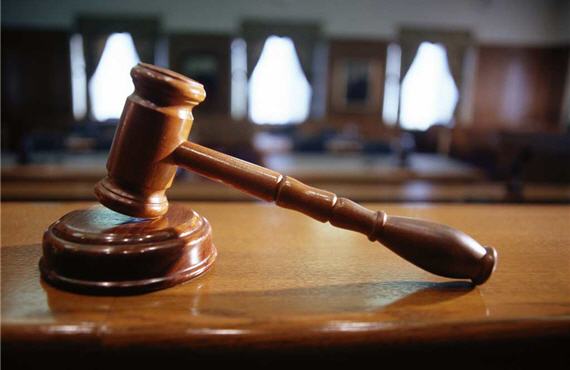Is “Twitter Stalking” Free Speech?
A case pending in Maryland raises the question of when boorish online behavior crosses the line from protected speech to criminal act.
A man under indictment in Federal Court for criminal stalking via Twitter is claiming protection under the First Amendment in a case that tests the limits of what constitutes acceptable online speech:
Even the Buddha of compassion might have been distressed to be on the receiving end of the diatribes that William Lawrence Cassidy is accused of posting on Twitter.
They certainly rattled Alyce Zeoli, a Buddhist leader based in Maryland. Using an ever-changing series of pseudonyms, the authorities say, Mr. Cassidy published thousands of Twitter posts about Ms. Zeoli. Some were weird horror-movie descriptions of what would befall her; others were more along these lines: “Do the world a favor and go kill yourself. P.S. Have a nice day.”
Those relentless tweets landed Mr. Cassidy in jail on charges of online stalking and placed him at the center of an unusual federal case that asks the question: Is posting a public message on Twitter akin to speaking from an old-fashioned soapbox, or can it also be regarded as a means of direct personal communication, like a letter or phone call?
Twitter posts have fueled defamation suits in civil courts worldwide. But this is a criminal case, invoking a somewhat rarely used law on cyberstalking. And it straddles a new, thin line between online communications that can be upsetting — even frightening — and constitutional safeguards on freedom of expression.
Federal authorities say Mr. Cassidy’s Twitter messages caused Ms. Zeoli “substantial emotional distress” and made her fear for her life, so much so that she once did not leave home for 18 months and hired armed guards to protect her residence.
In a complaint filed in federal court in Maryland, the Federal Bureau of Investigation concluded that Mr. Cassidy had published 8,000 Twitter posts, almost all of them about Ms. Zeoli and her Buddhist group, along with similar posts on several blogs.
Cassidy has been charged (Indictment in PDF) under 18 USC 2261A(2)(A) which makes it a crime punishable by at least five years in federal prison for anyone who:
(1) travels in interstate or foreign commerce or within the special maritime and territorial jurisdiction of the United States, or enters or leaves Indian country, with the intent to kill, injure, harass, or place under surveillance with intent to kill, injure, harass, or intimidate another person, and in the course of, or as a result of, such travel places that person in reasonable fear of the death of, or serious bodily injury to, or causes substantial emotional distress to that person, a member of the immediate family (as defined in section 115) of that person, or the spouse or intimate partner of that person; or
(2) with the intent –
(A) to kill, injure, harass, or place under surveillance with intent to kill, injure, harass, or intimidate, or cause substantial emotional distress to a person in another State or tribal jurisdiction or within the special maritime and territorial jurisdiction of the United States;
Cassidy’s actions are detailed in the Criminal Complaint (PDF) which sets forth the text of the numerous public Twitter messages that he composed regarding Zeoli and her group, which the prosecution contends were made with the intent to harass or intimidate her. Cassidy’s attorney’s however, argue that his online rants, all of which occurred in a publicly accessible forum rather than private communications directed solely at Zeoli, constitute protected speech under the First Amendment, and many legal analysts agree:
Mr. Cassidy’s lawyers with the federal public defender’s office argue that even offensive, emotionally distressing speech is protected by the First Amendment when it is conveyed on a public platform like Twitter. Legal scholars say the case is significant because it grapples with what can be said about a person, particularly a public person like a religious leader, versus what can be said to a person.
Eugene Volokh, a law professor at the University of California, Los Angeles, offered an analogy: the difference between harassing telephone calls and ranting from a street-corner pulpit. “When the government restricts speech to one person, the speaker remains free to speak to the public at large,” Mr. Volokh argued.
(…)
In support of a defense motion to dismiss the case, the Electronic Frontier Foundation, an advocacy group based in San Francisco, appealed to the court to protect online expression.
“While not all speech is protected by the First Amendment, the idea that the courts must police every inflammatory word spoken online not only chills freedom of speech but is unsupported by decades of First Amendment jurisprudence,” it wrote.
In an amicus curarie brief [PDF} filed on Cassidy’s behalf, the Electronic Frontier Foundation argues that the government’s allegations are insufficient to over come the relevant First Amendment objections:
The government’s sole allegation that “the posting of messages on www.twitter.com and other websites” regarding public figure Victim 1 “with the intent to harass and cause substantial emotional distress” is insufficient to state a criminal claim as it contradicts the controlling Supreme Court precedent in Hustler Magazine v. Falwell and its progeny. DN 1. Even if Mr. Cassidy”s “utterance [ s] [were] intended to inflict emotional distress,” such expression IS constitutionally protected. Hustler, 485 U.S. at 53. As the Supreme Court explained:
“Outrageousness” in the area of political and social discourse has an inherent subjectiveness about it which would allow a jury to impose liability on the basis of the jurors’ tastes or views, or perhaps on the basis of their dislike of a particular expression. An “outrageousness” standard thus runs afoul of our longstanding refusal to allow damages to be awarded because the speech in question may have an adverse emotional impact on the audience. See NAA CP v. Claiborne Hardware Co., 458 U.S. 886,910, 102 S.Ct. 3409,3424,73 L.Ed.2d 1215 (1982) (“Speech does not lose its protected character . . . simply because it may embarrass others or coerce them into action”). Id. at 55.
“[A] law imposing criminal penalties on protected speech is a stark example of speech suppression” that violates the First Amendment. Ashcroft v. Free Speech Coal., 535 U.S. 234, 244 (2002). The revised statutory section under which Mr. Cassidy was charged impermissibly suppresses such protected speech. As such, the criminal indictment against him must be dismissed.
The EFF also argues that the statute under which Cassidy is charged is unconstitutionally vague, particularly when it is applied to a medium such as Twitter, where dialogue is conducted in public unless the users choose to communicate privately:
The vagueness of 18 U.S.C. § 2261A(2)(A) is particularly problematic given the lack of proximity between a speaker using a broadcast service like Twitter and his online readers, since his speech is readily accessible by a global audience. It is nearly impossible for a speaker to anticipate what distress his tweets might prompt in any specific listener or group of listeners. Nor can a Twitter user know or control who is reading his tweets or what their particular sensitivities may be. Furthermore, 18 U.S.C. § 2261A(2)(A) gives law enforcement a great deal of leeway to target crude, aggressive, or unpopular speech, such as what a listener reports as “hateful, homophobic and misogynistic,,,16 that falls short of being a true threat or otherwise unprotected by the First Amendment
For the most part, I think the EFF gets the analysis right here. In addition to the cited cases, though, further insight into the First Amendment implications of the Cassidy case can be found in the Supreme Court’s March 2011 decision in Snyder v. Phelps, which upheld the First Amendment rights of the Westboro Baptist Church. In that case, Chief Justice Roberts said:
Given that Westboro’s speech was at a public place on a matter of public concern, that speech is entitled to “special protection” under the First Amendment. Such speech cannot be restricted simply because it is upsetting or arouses contempt. “If there is a bedrock principle underlying the First Amendment, it is that the government may not prohibit the expression of an idea simply because society finds the idea itself offensive or disagreeable.” Texas v. Johnson, 491 U. S. 397, 414 (1989). Indeed, “the point of all speech protection . . . is to shield just those choices of content that in someone’s eyes are misguided, or even hurtful.” Hurley v. Irish-American Gay, Lesbian and Bisexual Group of Boston, Inc., 515 U. S. 557, 574 (1995).
The jury here was instructed that it could hold Westboro liable for intentional infliction of emotional distress based on a finding that Westboro’s picketing was “outrageous.””Outrageousness,” however, is a highly malleable standard with “an inherent subjectiveness about it which would allow a jury to impose liability on the basis of the jurors’ tastes or views, or perhaps on the basis of their dislike of a particular expression.” Hustler, 485 U. S., at 55 (internal quotation marks omitted). In a case such as this, a jury is “unlikely to be neutral with respect to the content of [the] speech,” posing “a real danger of becoming an instrumentfor the suppression of . . . ‘vehement, caustic, and some-times unpleasan[t]'” expression. Bose Corp., 466 U. S., at 510 (quoting New York Times, 376 U. S., at 270). Such a risk is unacceptable; “in public debate [we] must tolerate insulting, and even outrageous, speech in order to provide adequate ‘breathing space’ to the freedoms protected by the First Amendment.” Boos v. Barry, 485 U. S. 312, 322 (1988) (some internal quotation marks omitted). What Westboro said, in the whole context of how and where it chose to say it, is entitled to “special protection” under the First Amendment, and that protection cannot be overcome by a jury finding that the picketing was outrageous.
Similarly, Cassidy’s statements on Twitter, a public place, on a matter of public concern are entitled to that same special protection. That they might be considered “outrageous” is not, by itself, sufficient to criminalize his behavior it seems to me. Had he threatened Zeoli directly or directed his messages to her in private, then we might be dealing with a different set of facts. Based on the facts available, it’s pretty clear that even though Cassidy was acting like a jerk, he was engaging in protected speech.
Update: Eugene Volokh comments on the case:
The statute is in any event unconstitutional as applied to Cassidy. To be sure, he badmouthed Zeoli a lot, but the First Amendment protects frequent speech as well as occasional speech. Someone who makes it his mission to repeatedly criticize a religious leader, whether Jerry Falwell or a leading Scientologist or Ms. Zeoli remains constitutionally protected, just as a newspaper is constitutionally protected even when it goes on a campaign of repeatedly criticizing some government official (unless the speech constitutes a true threat or libel, which are traditional exceptions to First Amendment protection).
And while Snyder leaves open the possibility that speech can lead to civil liability under the intentional infliction of emotional distress tort if it’s on a matter of merely “private concern” (though see the contrary view as to a criminal law in the United States v. Stevens “serious value” discussion), here many of the statements were on a matter of public concern — the moral and spiritual qualifications of a relatively prominent religious leader (again, compare the add in Hustler v. Falwell). For a sense of the prominence of Zeoli (also known as Catharine Burroughs), note that she was the subject of this somewhat critical biography by a Washington Post writer. (For more on the First Amendment overbreadth and as-applied challenges, see Cassidy’s motion to dismiss the indictment, which strikes me as largely correct on these points.)
Naturally, if the prosecution was brought under a statute that banned threats, and the prosecution was focused on those tweets and blog posts that might be seen as true threats, which are emotionally distressing because they are threatening, then the prosecution would be constitutionally permissible. The First Amendment doesn’t protect true threats. But this prosecution appears to go far beyond the threatening statements.
Volokh also comments on the broader policy ramifications of prosecutions such as this:
What’s happening — in this case and in some others, such as the abortive Renton prosecution related to videos that mocked certain police officers — is something that I warned about in this 1996 University of Chicago Legal Forum article: Narrow speech restrictions, such as restrictions on telephone harassment, stalking, and other unwanted contact, are now being broadened from essentially one-to-one contact (an insulting phone call, coming up to someone to berate them, sending continued unwanted mail or e-mail) to one-to-many contact (blog posts, tweets, messages readable by everyone in a chat room or on a discussion list, and so on).
The old narrow restrictions might well be constitutional (see, e.g., Rowan v. U.S. Post Office Department), but precisely because they deal with essentially one-to-one speech — restricting such unwanted speech to an unwilling listener leaves the speaker free to keep talking to other, potentially willing listeners. But they are now being expanded to cover not just insults said to a person, but also insults said about the person to the public at large. To be sure, such one-to-many speech can be just as offensive as one-to-one speech (and perhaps sometimes more so). But it is much more constitutionally valuable, precisely because it can reach potentially willing listeners. And suppressing it unconstitutionally blocks communication to such potentially willing listeners.
There isn’t a Constitutional right to not be offended, but prosecutions like this come dangerously close to creating one.







When you keep changing accounts to harass someone, you’re crossing a line. I can sit there and rip someone on twitter all I want, but they can block me so that they don’t have to see it. If Cassidy wants to be a jerk on twitter, thats up to him. But clearly he had intent to try and make his target’s life miserable(and Cassidy has a criminal past).
Chad,
Cassidy’s prior criminal record wouldn’t be relevant to these charges and would be likely inadmissible at trial
Speech qua speech is almost without bounds. But there are time, place, and manner restrictions. Isn’t this simply harassment? Could you call someone’s home at 3 am and say, “Do the world a favor and go kill yourself”? Do it repeatedly? I’m pretty sure that’s not protected. Certainly, it shouldn’t be.
Its called “blocking”. It’s just like if someone offends you and you tell them to “stop talking to you”. It’s free speech before, but not free speech after.
America has officially jumped the shark and has become stupid. Jail..for this..don’t they have REAL crimes they need to concern themselves with? I guess private prison need customers to fill up the prision.. All anyone has to do is BLOCK them on twitter or better yet don’t read the replies..problem solved
“such as what a listener reports as “hateful, homophobic and misogynistic,,”
I also find it strange that gays are protected but if a gay person does hate speech it not covered. I recall a gay activist named Dan Savage coining vulgar term for Presidential Candidate Rick Santorum and Dan Savage also said publicly he wish all Republicans would die. He wasn’t even fired..what about Misandry? The recent case with the husband who was drugged and sexually mutilated by his wife drew big laughs from women and even talk show host like Sharon Osborne who found it “funny”